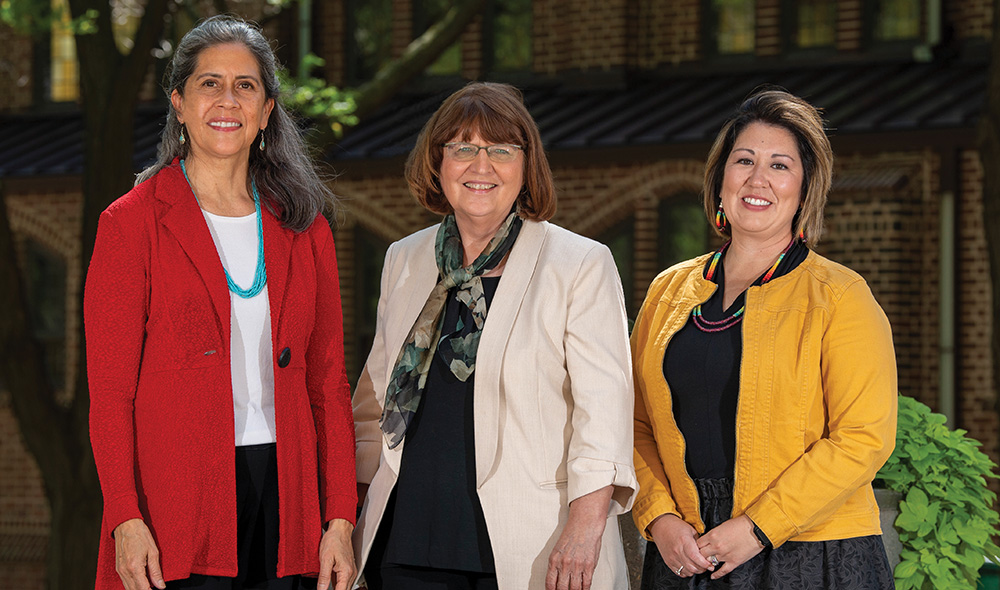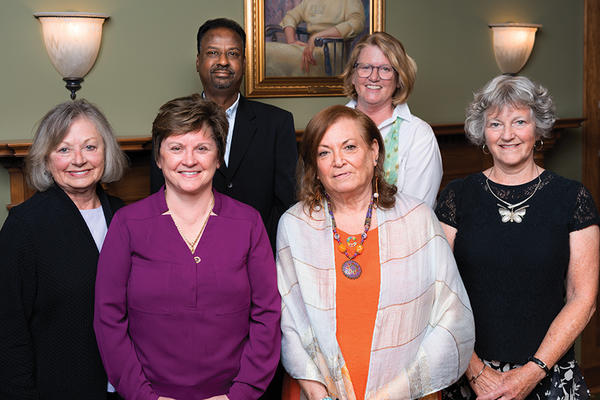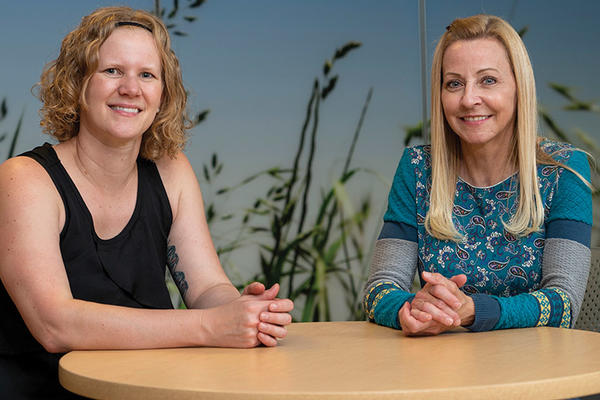Educating the next generation of doctorally prepared American Indian/Alaska Native nurses
HRSA awards the school a three-year, $1.5 million grant
October 25, 2022
Brett Stursa

Lisa Martin, Christine Mueller and Misty Wilkie are leading the effort to increase the number of American Indian/Alaska Native students in the school's DNP and PhD programs.
The University of Minnesota School of Nursing received a three-year, $1.5 million grant from the Health Resources and Services Administration to increase the number of doctorally prepared American Indian/Alaska Native nurses.
The project, Pathway to Graduate Nursing Degree for American Indian/Alaska Native Nurses, will address the underrepresentation of American Indian/Alaska Native nurses and, ultimately, the serious health disparities experienced by American Indian/Alaska Native people by improving health outcomes.
“Our project will establish an innovative, culturally sensitive pathway for American Indian/Alaska Native nurses to obtain a graduate degree in nursing – either a Doctor of Nursing Practice (DNP) degree or PhD in Nursing,” says Christine Mueller, PhD, RN, FGSA, FAAN, senior executive associate dean for academic programs. Over the course of the project, 15 American Indian/Alaska Native students will receive full financial support. The project also entails developing and implementing a sustainable mentoring program for American Indian/Alaska Native graduate nursing students. Additionally, the graduate nursing curriculum will be indigenized, which involves including the experiences, worldviews and history of Indigenous people that have not been included in nursing education.
Alleviating health disparities
The social determinants of health for American Indian people caused by racism, economic adversity and poor social conditions has led to disproportionate causes of death, such as heart disease, cancer and diabetes. Addressing the diversity of the health care workforce has been identified as a strategy to alleviate racial and ethnic health disparities. The School of Nursing boldly embraces this strategy.
“With greater diversity and appreciation for equality and health equity, nursing is well positioned to work with communities to make a positive difference,” says Clinical Associate Professor Lisa Martin, PhD, RN, PHN, AHN-BC, FAAN, a member of the Lac Du Flambeau Band of Lake Superior Chippewa Indians. Martin serves as a diversity consultant for the Future of Nursing: Campaign for Action and is a past-president of the National Alaska Native American Indian Nurses Association. “We have learned that when professionals help professionals who come from a cultural community and return to the community after education, they can make great strides in impacting health disparities. That’s the reason why we are so focused, especially in nursing, to create more doctorally prepared nurses with Native backgrounds.”
Data from the Minnesota Office of Rural Health and Primary Care shows that the nursing workforce is seriously lacking representation of American Indian/Alaska Native nurses, especially those with a doctoral degree. Less than 1% of nurses in Minnesota are American Indian/Alaska Native nurses, and of those, about 20 of them have a doctoral degree.
Representation matters
To increase the number of American Indian/Alaska Native nurses with graduate degrees, the school is building a supportive pathway for prospective students and a mentoring program for enrolled students.
“The goal is to build a relationship with Indigenous students while they are in their undergraduate program so that they get to know me, Dr. Martin and other Indigenous faculty and already have that sense of familiarity with faculty during their time as an undergrad,” says Clinical Associate Professor Misty Wilkie, PhD, RN, FAAN, a member of the Turtle Mountain Band of Chippewa Indians and former director of the Niganawenimaanaanig project at Bemidji State University that supports Indigenous nursing students.
“I recognize the importance of programs like Niganawenimaanaanig because we need so many more baccalaureate-prepared Indigenous nurses,” says Wilkie. “And I am excited about this program because I am not aware of any other program in the country that supports Indigenous nursing students at the doctoral level. There is a shortage of everybody, but we are always the least represented in any data that comes up.”
Wilkie, herself an alum of the School of Nursing’s PhD program, will assist faculty and student services staff in developing culturally appropriate support services and programming for American Indian/Alaska Native students enrolled in the DNP and PhD programs.
She says one of the most important reasons to have doctorally prepared nurses who are American Indian/Alaska Native is representation, something she remembers learning during her master’s program when she met Roxanne Struthers, PhD, an assistant professor at the University of Minnesota School of Nursing. “That was really huge for me, to see Indigenous nurses, especially women, in powerful leadership positions and to be able to visualize myself in those positions,” says Wilkie. “Without that representation, I don’t know if I ever would have dreamed as big of a dream as I did because I wouldn’t have known it was possible.”
A supportive academic structure
Martin, also an alum of the PhD program at the School of Nursing, will focus on indigenizing the curriculum. “There is an absence of Native perspectives in nursing education,” says Martin. “In order to support our goals of attracting and preparing Native American doctoral nursing students, we also need a supportive academic structure to our program that carries those same values.”
Martin first began collaborating with faculty in 2020 to integrate Indigenous perspectives, content and educational approaches in the nursing curriculum. Already, about 20 faculty have participated in the three month deep review and reflection, with additional faculty participating this fall.
Both Wilkie and Martin say they are eager to support and mentor the next generation of American Indian/Alaska Native graduate nursing students, just as they were mentored and supported at the School of Nursing. “This provides an opportunity for students to dream a bigger dream and to have that support available to them to help them be successful,” says Wilkie. “In the end we are creating more Indigenous advanced practice nurses working in tribal communities and hopefully creating more Indigenous nurse faculty and researchers.”


